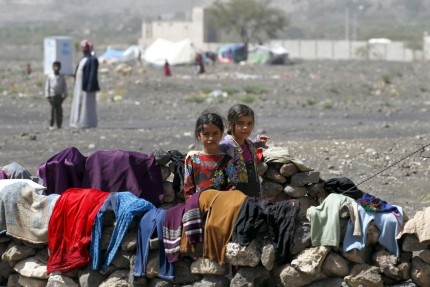
20 June 2016 – The number of people displaced from their homes due to conflict and persecution last year exceeded 60 million for the first time in United Nations history, a tally greater than the population of the United Kingdom, or of Canada, Australia and New Zealand combined, says a new report released on World Refugee Day today.
The Global Trends 2015 compiled by the Office of the UN High Commissioner for Refugees (UNHCR) notes that 65.3 million people were displaced at the end of 2015, an increase of more than 5 million from 59.5 million a year earlier.
The tally comprises 21.3 million refugees, 3.2 million asylum seekers, and 40.8 million people internally displaced within their own countries.
Measured against the world’s population of 7.4 billion people, one in every 113 people globally is now either a refugee, an asylum-seeker or internally displaced – putting them at a level of risk for which UNHCR knows no precedent.
On average, 24 people were forced to flee each minute in 2015, four times more than a decade earlier, when six people fled every 60 seconds.
Syria, Afghanistan and Somalia produce half the world’s refugees, at 4.9 million, 2.7 million and 1.1 million, respectively.
Colombia had the largest numbers of internally displaced people (IDPs), at 6.9 million, followed by Syria’s 6.6 million and Iraq’s 4.4 million.
While the spotlight last year was on Europe’s challenge to manage more than one million refugees and migrants who arrived via the Mediterranean, the report shows that the vast majority of the world’s refugees were in developing countries in the global south.
In all, 86 per cent of the refugees under UNHCR’s mandate in 2015 were in low- and middle-income countries close to situations of conflict.
Worldwide, Turkey was the largest host country, with 2.5 million refugees. In terms of the refugee-to-population ratio, Lebanon has the highest proportion, with nearly one refugee for every five citizens.
Distressingly, children made up an astonishing 51 per cent of the world’s refugees in 2015, with many separated from their parents or travelling alone, UNHCR said.
“Our responses to refugees must be grounded in our shared values of responsibility sharing, non-discrimination, and human rights and in international refugee law, including the principle of non-refoulement,” UN Secretary-General said in his message on the Day.
“World Refugee Day is a moment for taking stock of the devastating impact of war and persecution on the lives of those forced to flee, and honouring their courage and resilience,” he said, noting that it is also a moment for paying tribute to the communities and States that receive and host them, often in remote border regions affected by poverty, instability and underdevelopment, and beyond the gaze of international attention.
Last year, more than one million refugees and migrants arrived in Europe across the Mediterranean, in unseaworthy dinghies and flimsy boats. “Thousands did not make it – tragic testimony to our collective failure to properly address their plight,” Mr. Ban said.
He stressed that meanwhile, divisive political rhetoric on asylum and migration issues, rising xenophobia, and restrictions on access to asylum have become increasingly visible in certain regions, and the spirit of shared responsibility has been replaced by a hate-filled narrative of intolerance.
“With anti-refugee rhetoric so loud, it is sometimes difficult to hear the voices of welcome. But these do exist, all around the world,” he said, acknowledging an extraordinary outpouring of compassion and solidarity shown by host communities.
The UN chief drew attention to the General Assembly’s High-Level Meeting on addressing large population movements on 19 September, which he said will offer an historic opportunity to agree a global compact, with a commitment towards collective action and greater shared responsibility for refugees at its core.
This year, hopeful signs are hard to find
UN High Commissioner for Refugees, Filippo Grandi, said that each year, UNHCR seeks to find a glimmer of hope in the global statistics, but “this year the hopeful signs are hard to find.”
He warned that instead of burden sharing, nations are closing their borders and that instead of political will, there is political paralysis. And humanitarian organizations like his are left to deal with the consequences, while at the same time struggling to save lives on limited budgets.
Yet, there is cause for hope. Citing host communities, individuals, and families opening their homes, he said “these ordinary people see refugees not as beggars, competitors for jobs, or terrorists – but as people like you or me whose lives have been disrupted by war.”
“UNHCR sees 2016 as a watershed moment for the refugee cause,” he stressed. As wars spiral out of control, this must be a year to take collective responsibility and action to end the conflicts which force people to flee and also a year to help the millions of people whose lives have been destroyed by violence.
“World leaders can no longer watch passively as so many lives are needlessly lost,” he said, also noting that the upcoming General Assembly meeting on addressing large movements of refugees and migrants will put all to the test.
For its part, UNHCR launched last week the #WithRefugees initiative to generate momentum towards that meeting, he added.
Numbers do not capture hardship of displaced
Mogens Lykketoft, UN General Assembly President, said the numbers do little justice to the pain and trauma that this crisis is causing for individual women, men and children across our world.
“They fail to capture the hardship of those who flee and the fear of those who wait anxiously behind. They fail to capture the hopelessness of those held in detention centres or the final thoughts of those lost at sea without even a whisper,” he said.
He highlighted several points, including that the international community must intensify its efforts to find political solutions to conflicts, as they are the main drivers of humanitarian need. The UN and other institutions and agencies must be provided with sufficient and predictable resources needed to fulfil their mandates and respond to the incredible levels of need.
In 2014, children constituted 51 per cent of the refugee population, with half of these missing out on primary education, he said. The 2030 Agenda for Sustainable Development to leave no one behind has placed a new obligation on all to reach those in situations of conflict, disasters, vulnerability and risk.
Citing that almost nine out of every 10 refugees, 86 per cent, are in regions and countries considered economically less developed, he urged the international community to enhance its solidarity with refugee hosting countries.
Given the scale of the crisis, current levels of third-country resettlement need to be reviewed, he pointed out. In 2014, only 15 per cent of the global resettlement needs were met. At least fifty thousand persons, including thousands of children died in the past two decades while seeking to cross international borders. Governments must create safe, orderly and regular pathways for refugees to move to other countries.
Violations of international humanitarian and human rights law are of grave concern. All must speak out in the face of serious violations of international law. Xenophobic and racist rhetoric seems not only to be on the rise, but also to be becoming more socially and politically acceptable. This needs to change, he said.
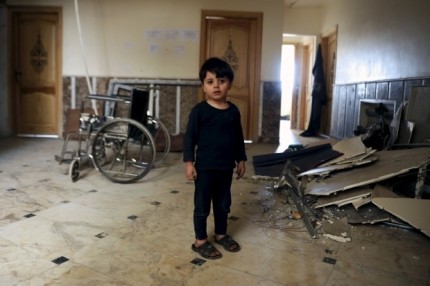
The United Nations envoy for Syria appealed to the U.S. and Russia to intervene to help revive Syrian peace talks that sputtered to a pause Wednesday, saying a recent spike in fighting has overshadowed the talks and put an increasingly feeble truce in “great danger.”
Staffan de Mistura spoke to reporters early Thursday after briefing the UN Security Council via videoconference about the largely stalled indirect talks between the Western- and Saudi-backed opposition and envoys from President Bashar al-Assad’s government, which has the backing of Moscow.
After 60 days, he said, the cessation of hostilities agreed to by both sides “hangs by a thread.”
“I really fear that the erosion of the cessation is unraveling the fragile consensus around a political solution, carefully built over the last year,” de Mistura said in his council briefing obtained by The Associated Press. “Now I see parties reverting to the language of a military solution or military option. We must ensure that they do not see that as a solution or an option.”
The current effort to end the five-year Syria conflict was largely spearheaded by U.S. Secretary of State John Kerry and Russian Foreign Minister Sergey Lavrov, backed by major global and regional powers who formed the International Syria Support Group. It includes 17 countries as well as the United Nations, Arab League, European Union and Organization of Islamic Cooperation.
‘Downward spiral’
De Mistura appealed not only for U.S.-Russia intervention but for international support, calling in the Security Council briefing for another ministerial meeting of the International Syria Support Group “lest we lose the window of opportunity to reverse the negative downward spiral.”
He stressed that the talks may not survive unless the fighting subsides, and that won’t happen “without some sort of political solution on the horizon.”
De Mistura said he hoped that the talks would resume in May, and he predicted the overall process would continue as previously planned through July. But he stopped short of setting a specific date, pointing to the recent upsurge in fighting, notably in and around Aleppo, Syria’s largest city before the war.
Lamenting the worsening violence, he said that “in the last 48 hours, we have had an average of one Syrian killed every 25 minutes, one Syrian wounded every 13 minutes … How can you have substantial talks when you have only news about bombing and shelling?”
Speaking at the end of a third session of Syria peace talks this year, de Mistura said the truce brokered by the U.S. and Russia had pulled off a “miracle” by sharply reducing violence in March, but acknowledged that the renewed fighting has put the cessation of hostilities “in great danger.”
U.S., Russia must work together: UN
He called for a “U.S.-Russian initiative at the highest level” to help reinforce it.
“There is no reason that both of them — who have been putting so much political capital in that success story and have a common interest in not seeing Syria ending up in another cycle of war — should not be able to revitalize what they created, and which is still alive, but barely,” he said of the two countries.
U.S. State Department spokesman John Kirby said he shared de Mistura’s concerns about the increased violence jeopardizing the process and urged Russia to press the Assad regime “to fulfill its commitments.”
The talks foundered last week after the Western- and Saudi-backed opposition called the High Negotiating Committee suspended formal participation in the indirect talks with Assad’s envoys to protest alleged government cease-fire violations, a drop in humanitarian aid deliveries and no progress in winning the release of detainees in Syria.
De Mistura suggested back-channel work between Moscow and Washington was already under way to help the truce, and that a revival of it would help bring the two sides back to the table.
“I know that both the Russian Federation and the U.S. are talking among themselves on how to salvage on what has been actually a remarkable success — but needs to be sustained,” he said, referring to the cease-fire. If it is revived, he predicted: “It will not be difficult for everyone to come back around the table.”
TO FIND OUT HOW WE ARE INVOLVED IN SYRIA, CLICK HERE.
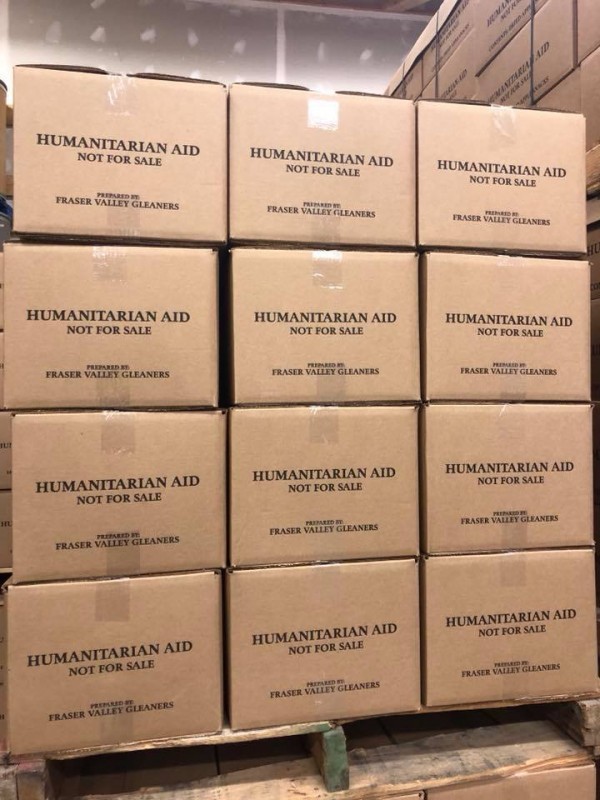
Fraser Valley Gleaners has been an integral partner of ours!
Click here to see why.
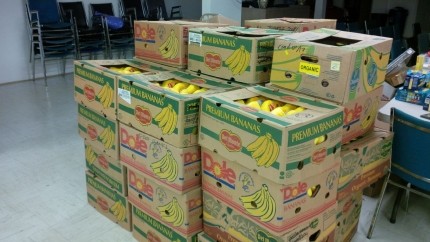
Refugees are resettling in Canada with very little in hand, so when an opportunity arose to supply some much needed items to a local centre that aids refugees, we happily took it.
On Friday February 5, 2016, we loaded up two trucks full of donated items and took four trips to the Middle Eastern Friendship Centre, a place where new settlers from the Middle East and Africa could gather together in Surrey, B.C.
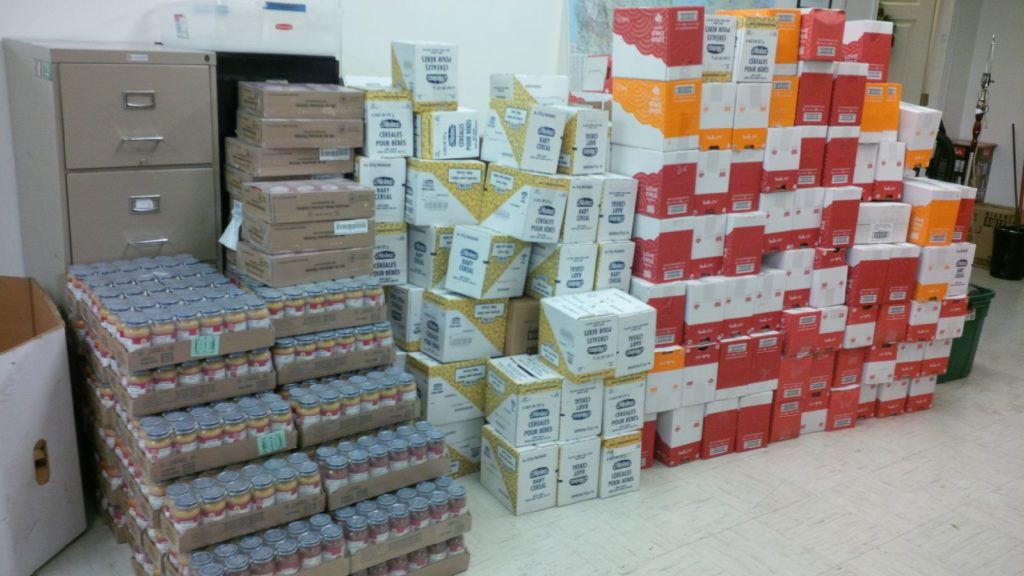
While GAiN has initiatives focused on helping Syrian IDPs (Internally Displaced People) within Syria, refugees that come into Canada are not usually our primary focus.
”We have chosen to help internally displaced Syrians whose plight is not often highlighted in the news media,” explained Aaron Rogers, GAiN’s Chief Operations Officer. “However, because we received this donation of goods, there was an opportunity through a local organization to support refugee families [from all different countries] coming into Canada.”
Back in August 2014, we received a generous donation which just so happened to align with the needs of the Middle Eastern Friendship Centre.
“Do you have a need for diapers? I have all these diapers, would you be interested?” Rogers asked the centre’s founders, as we had just received two pallets of diapers from a donor.
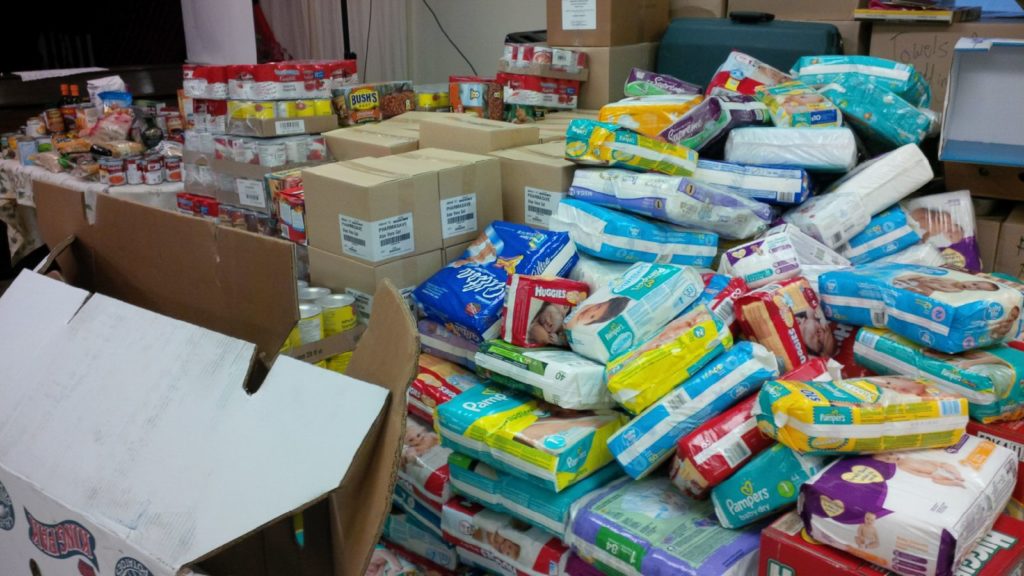
“His jaw just dropped,” Rogers recalls. “He and his wife were in tears. They were saying they have all these families coming in with babies and they have nothing to give them when they come to the centre.” At the time they had furniture and other items available but were lacking necessities such as canned food and diapers.
Fast forward to present day and the need for donated goods is still great. Canada has reached the commitment to resettle 25,000 Syrian refugees. As of March 22, 2016, 26,202 refugees from Syria have landed in Canada since November 5, 2015, according to statistics from Citizenship and Immigration Canada.
So, when we received pallets of diapers, canned food and baby cereal from the same donor from two years before, Rogers had the Middle Eastern Friendship Centre in mind.
The significance of refugees’ needs was reflected in the founders’ priceless reaction to news that we would be donating more goods. “He was just in tears. It was an answer to prayer for him.”
When GAiN received the goods, Rogers recruited some of the office staff located at our headquarters in Langley, BC to load up trucks to drive the donated goods to the centre.
“We have an opportunity to help refugee families coming into Canada, many of them from Syria and Iraq. It’s not one of our projects, but …we’re also looking for opportunities to help people. As this opportunity was presented to us by the Middle East Friendship Centre, we were thrilled to take it on and bless them.”
IF YOU WANT TO LEARN MORE ABOUT GAIN’S WORK IN SYRIA, CLICK HERE.
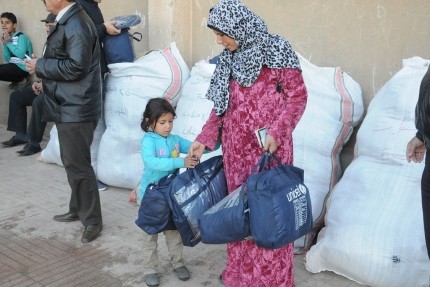
2 February 2016 – With four million Syrian and host community children in need of education and no let-up in sight in the fighting tearing the country apart, the United Nations and its partners are seeking $1.4 billion at a major conference in London on Thursday to save the current youth generation.
“The scale of the crisis for children is growing all the time, which is why there are now such fears that Syria is losing a whole generation of its youth,” said UN Children’s Fund (UNICEF) Regional Director for the Middle East and North Africa, Peter Salama, whose agency is coordinating the ‘No Lost Generation Initiative’.
“As a result of all the work being done by partners and donors, education and protection for children are now being prioritized. But what we must see in London is the step-change necessary to bring all children back to learning; to protect those who are at risk of dropping out; expand safe and inclusive learning environments; recruit and train more teachers; improve the quality of education, and support the development of technical, vocational and life skills opportunities for youth.”
The London conference is being co-hosted by Britain, Germany, Kuwait and Norway, and leaders from more than 30 countries are expected to attend, with the aim of raising new funding to meet the immediate and longer-term needs of those affected by the crisis.
Nearly five years into the Syrian war, some four million Syrian and host community children and youth aged 5-17 years are in need of education assistance, including 2.1 million out-of-school children inside Syria and 700,000 Syrian children in Turkey, Lebanon, Jordan, Iraq and Egypt.
Last year, the combined efforts of Governments and international partners helped more than one million children and youth inside Syria benefit from formal or non-formal learning opportunities. But with no political solution in sight to one of the most brutal conflicts the world has seen in decades, the number of children missing out on an education continues to climb.
Governments at the London meeting will also be urged to put more pressure on parties to the Syria conflict and those who support them to end attacks on schools and other places of learning, in accordance with international humanitarian law.
According to UNICEF, the killing, abduction and arrest of students and teachers has become commonplace, as have arbitrary attacks on schools. About one in four schools cannot be used because they have been damaged, destroyed or are being used as shelters for the internally displaced or for military purposes.
The No Lost Generation Initiative was set up in 2013. By the end of 2015 1.2 million children and youth inside Syria benefitted from improved formal and non-formal learning opportunities and more than 650,788 in Egypt, Iraq, Jordan, Lebanon and Turkey received school supplies or support through cash grants.
GAIN IS COMMITTED TO HELPING 1,000 FAMILIES WITHIN SYRIA. OUR HEARTS BREAK WITH THE DAILY REALITY MANY OF THESE CHILDREN AND THEIR FAMILIES ARE EXPERIENCING.
IF YOU WOULD LIKE TO READ MORE ABOUT OUR WORK, CLICK HERE.
Many Syrian IDPs (Internally Displaced People) first come to our partner’s building because someone tells them they can get a Bag of Blessing there. Each Bag of Blessing consists of food and non-food items. With the onset of winter, blankets and heaters were now added to each bag.
After individuals would come to the center and the volunteers and staff showed them love and kindness, the individuals usually became a part of the community. Often they kept coming, even if they no longer needed a Bag of Blessing.
Recently, a local staff member shared a story of a grandmother who first came to the center looking for aid…
“After some time, we learned that she had two little girls. They were her great-grandchildren, ages three and five. The reason why they were staying with her was because the girls came from a broken home. Their mother left them and their father did not work. They had no one to look after them. Their dad was also abusive toward the girls and it was a very bad situation.
The grandmother used the Bag of Blessing and took care of the girls. Her life was changed through that bag. I am thankful for this time because I had the opportunity to be able to see how God works through people.
She began to come every Saturday to share with me about her difficult circumstances concerning her grandchildren. At times, we were not always able to supply their needs, but I could see how God was working in her life, and how He was protecting these little kids from an abusive father.
Maybe the aid that we were able to give her gave the grandmother the strength to continue helping these little girls to have food and clothing, to grow, be healthy and warm.”
As of today, we are helping provide 1,000 families (totaling 5,000 individuals) with basic necessitites through the Bags of Blessings.
WOULD YOU LIKE TO HELP PROVIDE HOPE AND AID FOR ANOTHER PERSON SUCH AS THIS GRANDMOTHER AND HER FAMILY?
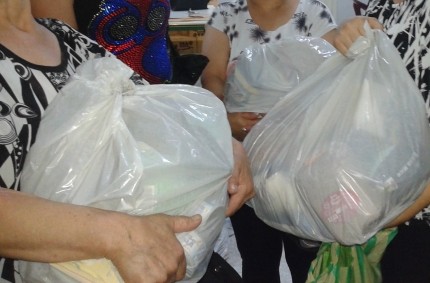
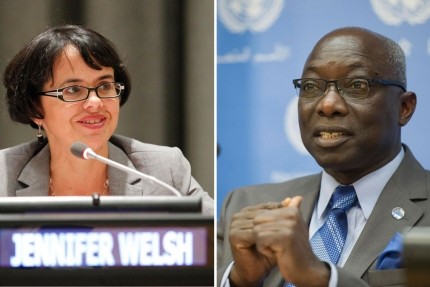
13 October 2015 – Senior United Nations human rights officials today expressed their alarm at the rise in violent rhetoric by influential religious leaders – including calls for “holy war” against certain faiths – in relation to the situation in Syria.
The UN Secretary-General’s Special Adviser on the Prevention of Genocide, Adama Dieng, and Special Adviser on the Responsibility to Protect, Jennifer Welsh, condemned the recent call by clerics in Saudi Arabia for Sunni Muslims and their States to support a “holy war” against Shia Muslims and Christians in Syria, as well as against States and non-State armed groups perceived to support them.
“Such rhetoric can aggravate the already extremely volatile situation in Syria by drawing religiously motivated fighters to join all parties to the conflict, thus escalating the risk of violence against religious communities,” said the Advisers in a statement, adding that “advocacy of religious hatred to incite or justify violence is not only morally wrong, but also prohibited under international law.”
Mr. Dieng and Ms. Welsh also expressed concern at reports that Russian Orthodox clerics had referred to the Russian participation in the conflict in Syria as a “holy battle” against terrorism, as “statements of this kind can be manipulated, feed suspicion and increase polarization of communities.”
The Special Advisers also noted the response by Russian authorities, who reportedly denied that there was any religious connotation to their involvement in Syria.
They praised the organization Syrian Christians for Peace for rejecting the concept of a Christian “holy war” and condemning those who invoke it.
The Special Advisers called on States to dissociate themselves from and condemn any form of advocacy of religious hatred, promote dialogue and protect and empower all those religious figures and human rights defenders who are working towards enhancing interreligious respect and harmony.
The officials also called on religious leaders around the world to refrain from any form of advocacy of religious hatred and incitement to violence, and to counter any use of such rhetoric, emphasizing that “religious leaders should be messengers of peace, not of war.”
“In situations in which tensions are high, as in Syria, religious leaders should call for and foster restraint and dialogue, rather than fanning the flames of hatred,” they cautioned.
If you want to read more about how GAiN is working in Syria, click here.
(Article Source)
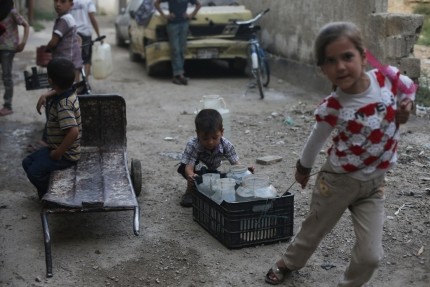
16 September 2015 – The United Nations Children’s Fund (UNICEF) has condemned in the strongest terms mortar attacks on civilian areas of Aleppo, Syria, which reportedly killed at least 19 children yesterday, including six in a UNICEF-supported child friendly space.
“Child friendly spaces enable children to play and reconnect with their childhood, and forget, even if for a short time, the horrors of war. They must never be targeted,” Hanna Singer, UNICEF Representative in Syria said in a statement.
“This reprehensible attack shows that even the simple act of playing represents a grave danger for children in Syria,” she added.
In recent weeks, several indiscriminate attacks have been reported in civilian populated areas leading to the death and injury of scores of children.
“These attacks highlight a flagrant disregard for the laws of war. They are a stark reminder that nowhere in Syria is safe for children,” Ms. Singer warned.
UNICEF is calling on all parties to the conflict in Syria to immediately halt such attacks and do their utmost to protect civilians and civilian infrastructure such as schools, health clinics and water facilities, in accordance with international humanitarian law. The agency urged that all civilians including children to be protected at all times.
In his briefing to the UN Security Council today, Under-Secretary-General for Humanitarian Affairs Stephen O’Brien highlighted the impact of the conflict on Syria’s children and young people.
“Today, Syria is one of the most dangerous places on earth to be a child,” he stated, adding that over 5.6 million children are in need of immediate assistance. In addition, children continue to be murdered, tortured and subjected to sexual violence by all parties to the conflict. “Millions of children have been traumatized by the horrors they have witnessed.”
In addition, Mr. O’Brien noted that, although the school year commenced this past week, over two million children – one out of every three – are not in school in Syria, and an additional 450,000 children are at risk of dropping out. He also expressed his concern that, in areas controlled by the Islamic State of Iraq and the Levant (ISIL), schools were using a curriculum designed by the terrorist group.
IF YOU WOULD LIKE TO KNOW HOW WE ARE COMING ALONGSIDE SYRIAN CHILDREN AND THEIR FAMILIES, CLICK HERE.
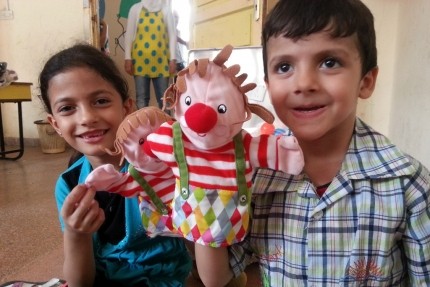
15 September 2015 – As children around the world return to school, there are more than two million in Syria who will not be able to join them, the United Nations Children’s Fund (UNICEF) cautioned today, adding that another 400,000 are at risk of dropping out of school as a direct result of conflict, violence and displacement.
With the conflict in Syria now in its fifth year, some children in Syria have never known what it is like to enter a classroom, while others have lost up to four years of their schooling, the agency noted in a news release.
“Syria’s basic public services, including education, have been stretched to the maximum,” said Hanaa Singer, UNICEF Representative in Syria. “We need to do so much more to help the education institutions from collapsing and increase opportunities for children to access education across the country.”
School buildings are also affected by the conflict; 5,000 of them cannot be used as they have been destroyed, converted into shelters for displaced families, or used as bases for armed forces, UNICEF said. Often, the schools and their surroundings are unsafe, dangerous for children to reach, and at risk of deliberate attack. To take their exams last summer, at least 20 per cent of Syria’s children were forced to cross lines of fire.
UNICEF has been working with local partners on the ground to reach around three million children, and has implemented an informal education programme to reduce the number of out-of-school children. The agency is also printing school supplies and text books locally and distributing them to students.
“Even under the worst circumstances Syrian children keep asking to learn and go back to school because they are yearning for a better future and a chance to be influential” said Ms. Singer. “We must all invest in Syria’s children as they are the future of Syria and they will help rebuild their country when peace returns.”
Under the ‘No Lost Generation Initiative,’ UNICEF is starting a self-learning programme to reach 500,000 children who missed out on years of schooling. An accelerated learning programme is also aimed at helping 200,000 children catch up with their learning and eventually reintegrate into formal education. UNICEF is also rehabilitating damaged schools and creating prefabricated classrooms to accommodate 300,000 additional children.
UNICEF requires $68 million by end of the year, of which $12 million is needed immediately in order to continue responding to children’s educational needs.
IF YOU WOULD LIKE TO KNOW HOW WE ARE COMING ALONGSIDE SYRIAN CHILDREN AND THEIR FAMILIES, CLICK HERE.
(Article Source)
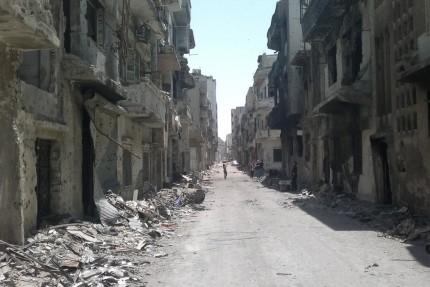
16 September 2015 – The United Nations humanitarian chief today urged the Security Council to find a political solution to end the conflict in Syria, warning its members that the fighting had created one of the largest refugee exoduses since the Second World War.
“It is civilians who continue to bear the brunt of this war,” Under-Secretary-General for Humanitarian Affairs and UN Emergency Relief Coordinator Stephen O’Brien told the Council, appealing to the 15-member body to find “a political settlement that brings an end to the crisis.”
Mr. O’Brien noted that, 18 months after the Security Council adopted resolution 2139, its demands to allow unhindered humanitarian access to the country had gone unheeded, and there had been no reduction in the appalling patterns of human rights violations.
Government forces, he said, had repeatedly attacked residential areas during between 17 and 26 August. During the last week of August, non-State armed groups had launched hundreds of shells, killing at least 20 civilians.
He warned of a “deliberate targeting of civilian infrastructure,” including water and electricity networks, as well as schools and medical facilities.
In 2014, he said, some 169 reported attacks on medical facilities occurred, and 259 medical worked were killed. Additionally, since the start of 2014, the UN has verified at least 84 attacks on or near schools.
“Today, Syria is one of the most dangerous places on earth to be a child,” said Mr. O’Brien, noting that over two million children are not in school and a further 450,000 are at risk of dropping out. He also expressed his concern that, in areas controlled by the Islamic State of Iraq and the Levant (ISIL), schools were using a curriculum designed by the terrorist group.
He also outlined the current state of humanitarian aid delivery in Syria, warning that the UN and non-governmental partners were still unable to deliver sufficient quantities of aid to the hardest-to-reach areas of the country.
Lack of funding, said Mr. O’Brien, continued to be a major challenge, and that $738 million was needed to fund essential life-saving operations until the end of 2015.
The Under-Secretary-General called on members of the Security Council to do more to demand an end to indiscriminate violence in Syria, and to ensure that humanitarian assistance is able to reach all areas of the county. Above all, he said, the Council should find a political solution to “end this nightmare” for the Syrian people.
GAIN IS PROVIDING AID TO SYRIANS WHO ARE DISPLACED WITHIN THEIR OWN COUNTRY. CLICK HERE IF YOU WOULD LIKE TO KNOW OUR RELIEF EFFORTS.
(Article Source)
